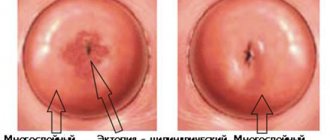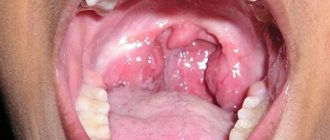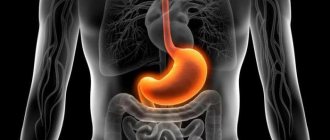“Well, I don’t want anything at all - I just cry constantly and smoke 2 packs a day. Crying and whining especially irritate me,” this is how one of my friends describes her condition. According to statistics collected by professional psychologists, approximately 1/8 of all women face the consequences of childbirth in the form of depression.
In this article we will talk about how to deal with postpartum depression, how to get rid of its main symptoms and how to cope with the consequences. So, let's begin.
The situation is extremely difficult due to the fact that women deny such depression. After all, often mothers themselves and the people around them deny the very fact of the presence of postpartum depression, the syndromes and signs of which will be described below. Remember, if you let it take its course, the consequences for both mother and child can be extremely serious.
Depression after pregnancy and childbirth - what is it?
The most typical occurrence of such depression is in the third trimester of pregnancy, when immediate preparation for childbirth begins. It is at this time that a woman begins to worry very much about both the birth of a child and her state of health. Concern grows by leaps and bounds when a girl realizes that she will not be able to provide her child with ideal care and 100% of her attention. We’ll tell you below how to get out of this state and how to help yourself.
Unfortunately, many people now have, in some sense, a highly idealized idea of what motherhood and child care is. In dreams and thoughts that are actively fueled on TV, the process looks something like this - everyone is extremely happy and has absolutely no worries, everyone is cheerful and everything is in order. However, in practice, this is far from the case - the mental state of the girl who has given birth undergoes serious changes.
An extremely important fact is the fact that only 4-5% of the number of young mothers suffering from postpartum depression receive qualified professional help from a psychotherapist who can help diagnose the disease and advise how to treat it. At the same time, experts claim that certain symptoms of postpartum depression occur in almost half of women who have given birth, and answering the question of how long the symptoms last is almost impossible even for the most experienced psychotherapist.
Just temporary blues or serious depression in women
It is extremely important for the woman herself and her loved ones to separate ordinary fatigue and mood swings from postpartum depression. Of course, the first months after childbirth become serious challenges for any girl, but love for the baby and immense happiness prevail over any fatigue and difficult sleepless nights. Such emotions completely disappear in literally 1-3 months, but the differences between truly prolonged depression are this:
- Depression appears immediately after childbirth - this condition lasts up to a year after a successful delivery.
- Symptoms are similar to other types and types of depressive disorder - from a constant apathetic state to the inability to perform activities that previously brought pleasure.
- Blues usually goes away quickly, and the answer to the question of how long the symptoms last is up to several years. This is due to the fact that a girl who does not want to ask someone for support and does not want to contact a psychologist tries in public to play a kind of “role” of a mother who has no problems - this can only aggravate the problem, and not solve it at all.
- Postnatal depression often results from the fact that in childhood certain difficulties were experienced in the upbringing or development of a girl specifically in the aspect of maternal upbringing.
In short, postnatal depression is roughly characterized by the fact that a girl, constantly telling herself inside, what a bad mother she is and how nothing is and won’t work out for her, while categorically refusing professional help. Only a few questions arise - how to cope with depression after childbirth ? How to get out of a state that can lead to big problems?
What is postpartum depression
This is a mental illness with a profound decline in mood and behavior.
You need to talk to a woman more often about what worries her, patiently listening to everything that happened to her and the child in the absence of her husband. The birth of a child brings many strong emotions, ranging from delight and joy to fear. But many young mothers also experience another feeling: depression.
For a few days after giving birth, many women experience a mild depression called baby blues. This condition can last from a few hours to two weeks after birth. However, for some women it takes a more severe form called postpartum depression, which can last weeks or even months after giving birth. Without treatment, this can drag on for a year or more.
Postpartum depression is depressive symptoms that persist more than 2 weeks after birth and interfere with daily activities.
Postpartum depression occurs in 10-15% of women after childbirth.
Any woman is at risk, but women are most susceptible to:
- transient postpartum depression,
- history of depression,
- depression after previous childbirth,
- family history of depression,
- stress factors,
- lack of support (for example, from a partner or family members),
- mood changes during the perimenstrual period,
- unfavorable birth outcome.
The exact etiology is unknown, but previous depression and hormonal changes during the postpartum period, insufficient sleep are major risks, and genetic predisposition may also contribute.
Unlike transient postpartum depression, which usually lasts 2-3 days (maximum 2 weeks) and has mild symptoms, postpartum depression lasts more than 2 weeks and interferes with daily activities.
Causes
Pregnancy and childbirth are stressful for a woman’s body, no matter how trivial it may sound. Although carrying a child and giving birth are intended by nature, it must be admitted that modern ladies are not ready to cope with these tasks on their own.
If you have ever observed the birth of a cat, for example, you may have noticed that she does not need any obstetric care, and veterinarians are extremely rarely present at the birth of kittens. Is a modern pregnant woman able to not get confused before labor begins at an inopportune time? This is unlikely.
Postpartum depression is a pathological condition of a woman who has recently given birth, associated with changes in hormonal levels, increased responsibility, household chores, and monotony of everyday life.
It manifests itself as a whole complex of symptoms: sudden changes in mood, uncontrollable outbursts of anger, hysterics, and an incomprehensible feeling of guilt for all of the above.
For the medicine of our time, this condition represents a big problem, since it has been little studied, and its symptoms are similar to other types of depression and psychosis.
Statistics show that postpartum depression in women occurs in 10-15% of cases, but only 3-4% of them turn to psychologists or doctors for help.
In addition to physiological reasons (hormonal changes, fatigue, pain, etc.), a woman’s condition after childbirth is determined by emotional and psychological reasons:
- increased degree of responsibility, heightened perception of the surrounding world;
- awareness of a new social role (“parent”), the desire to understand and accept the actions of their parents, which involuntarily emerge in a woman’s memory;
- fear of changes in one’s own body (weight gain is not the least of them);
- discrepancy between the desired and the real (if they were expecting a daughter, but a son was born, or the birth was difficult, and the support of the partner was not received as expected).
Causes of postpartum depression in women
Frequency: 10-15% of postpartum women. It is facilitated by neuro-endocrine changes before pregnancy. Additional provoking factors are low levels of education, unstable marital status or a broken family. Heredity for this complication in 1st and 2nd degree relatives also contributes to depression.
There are three variants of the course of postpartum depression:
- Postpartum depression is temporary. This state of short-term depression occurs in 1/3 of postpartum women shortly after childbirth and goes away on its own, without special treatment;
- atypical forms of postpartum psychoses (the same cyclothymic or bipolar alternation of manic and depressive psychoses).
The specificity of the postpartum period is that often women in the last weeks of pregnancy are more or completely separated from the family, due to complications they cannot have closeness with their husbands, communication with relatives is limited, and all this can lead to problems in the family. This negatively affects the mental state of the pregnant woman. In addition, women are subjected to various diagnostic methods, the results of which are alarming, frightening, and cause a state of constant anxiety. If pregnancy was initially unwanted or subconsciously rejected, then this is also a risk of psychosis. Complicated childbirth, trauma and blood loss in the mother, and injury to the newborn aggravate the situation. If during pregnancy a high level of placental hormones ensured the intensity of blood flow in the vessels of the placenta, and at the time of birth contributed to the contractility of the uterus, then after childbirth the level of hormones drops sharply, which causes significant moral and emotional devastation.
The cause of postpartum depression is unclear. Perhaps physical, mental, and social factors play a role. After childbirth, levels of the hormones estrogen and progesterone drop sharply. In addition, changes occur in blood volume, pressure, immune system and metabolism. All these changes can affect a woman’s physical and mental well-being.
Other factors that can cause postpartum depression and increase its likelihood include:
- Presence of depression before or in relatives.
- Negative childbirth experience.
- Severe or life-threatening pregnancy.
- Pain or complications after childbirth.
- Difficulties caring for a child.
- Exhaustion from caring for a child or several.
- Frustration due to unrealistic expectations of motherhood.
- Stress due to changes at home and at work.
- Feeling of loss of identity.
- Lack of support.
- Difficulties in relationships with others.
Prognostic factors for postpartum depression:
- Severe mental disorders: schizophrenia;
- affective insanity;
- postpartum psychosis;
- severe depression.
Symptoms and signs of postpartum depression in women
In the first few days after childbirth, many women experience a bad mood and sadness. They may be slightly depressed, whiny and irritable. These subclinical manifestations reach their peak by 4-5 days after birth, and usually disappear by 10 days. According to some data, women who experience such “blues” are more likely to develop PPD in the future.
Postpartum depression is temporally tied to the birth of a child, but its symptoms are no different from ordinary depression. Episodes of depression occurring in the first year after childbirth are also considered PPD.
Manifestations of postpartum depression:
- Depressed mood.
- Tearfulness.
- Loss of appetite and weight loss.
- Inability to rejoice, experience happiness, lack of interest in life.
- Sleep disturbance.
- Feelings of hopelessness, inability to cope, worthlessness.
- Decreased libido.
- Drowsiness.
- Decreased attention.
- Psychomotor retardation.
Typically, symptoms develop gradually over 5 months, but the onset may be sudden. Postpartum depression prevents women from caring for themselves and their baby. Psychosis is rare, but postpartum depression increases the risk of suicide and infanticide, which are the most severe complications.
Women cannot form an attachment to their child, which can cause emotional, social and cognitive problems in the child.
Fathers also have an increased risk of depression and stress.
Without treatment, postpartum depression can resolve on its own, but it can also become chronic. The risk of relapse is 1 in 3-4 cases.
Signs and symptoms of moderate depression include episodes of anxiety, sadness, irritability, crying, headaches and feelings of worthlessness. This often goes away within a few days or weeks. But sometimes postpartum depression can develop. With postpartum depression, symptoms are more intense and longer lasting.
These include:
- Constant feeling of fatigue.
- Lack of appetite.
- Lack of joy in life.
- Feeling trapped and emotionally dull.
- Withdrawal from family and friends.
- Reluctance to take care of yourself and the child.
- Insomnia.
- Excessive concern for the child.
- Loss of interest in sex.
- Severe mood swings.
- Feelings of failure or inadequacy.
- Inflated expectations and demands.
- Difficulties in understanding what is happening.
If you feel depressed after having a baby, you may find it difficult to admit it. But it's important to tell your doctor that you have symptoms of postpartum depression.
The first symptoms of depression appear during the first six weeks of the postpartum period. The first thing to appear is a decrease in mood in the morning, and the earlier a woman wakes up, the worse her mood. Her sleep is disturbed. The condition is so depressed that my appetite is reduced and I don’t feel like eating. But here there is the exact opposite option: decreased mood, depression and weakness lead a woman to the refrigerator and stove. Accordingly, weight decreases or increases. A feeling of guilt and self-abasement appears, self-accusation for no reason. Self-esteem also decreases. Attention is impaired, child care suffers, and there are visible hesitations before making decisions. At the same time, increased anxiety and concern about the condition of the newborn and his safety appear. When communicating even with loved ones, irritability appears - “don’t touch me, leave me alone!” The vision of the future is gloomy and hopeless. Accordingly, interest in life is lost and libido decreases.
The general tone is reduced, weakness, fatigue lead to the eternal depressive “position” on the sofa or bed, facing the wall.
Postpartum psychosis can be a manifestation of blood poisoning - sepsis, so a general examination is required - blood and urine tests, blood cultures. It is possible that postpartum psychosis is again a manifestation of bipolar or cyclothymic disorder - manic-depressive psychosis.
Psychosis is a mental disorder in which there is a loss of contact with reality, hallucinations, delusions, and thoughts appear. Hallucinations - false perceptions, usually auditory delusions - false beliefs may include persecutory, religious delusions; disorganization of thinking - a violation of the logic of the thinking process. However, women with an existing diagnosis of a mental disorder may experience worsening of the disorder during pregnancy. Relapse rates are also high for women who had psychosis during a previous pregnancy.
Now the main occupation of a woman is caring for a newborn. For about a year, all her time will be completely devoted to him, and the first few months the load will be doubly greater. The mother will have to feed, swaddle, care for, respond to the slightest mood swings, doubt and worry, regardless of whether it is the first child or not. Of course, most of all the baby needs his mother, her love and support. She understands him like no one else, rejoices at his first successes and worries if something goes wrong. And although it is believed that the father and his participation in the process of care and upbringing are also extremely necessary for the child already during the first year of life, often this burden falls heavily on the mother’s shoulders.
Both physically and psychologically, a woman is in a stressful state, she gets tired quickly, and sometimes develops chronic lack of sleep.
Attachment to a child, dependence on his well-being and needs forces a woman to significantly change her lifestyle and minimize her personal time. Added to this are physical fatigue and nervous exhaustion after childbirth, and sometimes postpartum hormonal imbalance. As a result, a woman may experience postpartum depression. Its symptoms: moodiness, melancholy, depression, inconsistency of actions and extreme touchiness. The woman becomes tearful, her mood changes frequently and for no reason, her intelligence decreases, and she does not want to move. Sometimes appetite decreases and sleep deteriorates. Sudden weight fluctuations are possible. The skin becomes dry, hair and nails become brittle, blood pressure rises or falls, and the heart rate noticeably increases.
A woman’s relationships with relatives and friends deteriorate sharply, and unmotivated aggression towards the child may appear, accompanied by a feeling of guilt. The situation is further complicated by the fact that in many cases the woman is also burdened with household chores. If her family and, first of all, her husband do not understand her, if they do not strive to help and take on part of the daily worries, this is a serious test. It’s even worse if the husband goes into open conflict and accuses his wife of selfishness, hysteria, inability to cope with housework and raising a child, and threatens to leave home. In this case, the woman’s depressive condition may worsen to such an extent that it requires emergency medical intervention. At this crucial moment, the correct reaction of loved ones, especially the husband, is very important. He is quite capable of taking on a significant part of the household chores, especially those requiring physical effort, and providing his wife with the opportunity to take care of only the child, without being distracted by everyday trifles.
It is necessary to support your spouse emotionally - share her hobbies, walk with her, read aloud to her, listen to music. It’s good if your family initially has a warm, trusting relationship, in which case everything happens by itself. In other cases, some effort should be made to create a positive atmosphere in the home.
If you are showing signs of postpartum depression, don't be scared or blame yourself. This is the body's natural response to postpartum stress. It will end soon, and you won’t even remember about them. Try to pull yourself together and be a little more tolerant of your family. For them, this is also a serious test, all the more serious because they did not experience what you had to endure. Be a little more lenient with them. Now you all have one big task - to raise a new good person. You are the most wonderful mother, you have the most wonderful baby, and all problems are solved as they arise. Don't worry about little things. Try to explain to your loved ones that you still love them, but you need their help and support. Ask them to sit with the baby, and devote some time to yourself - go to the hairdresser, to the cinema, just for a walk, visit friends. Take a break from your worries for a while! Believe me, nothing bad will happen during your short absence. Mom and husband will cope with everything perfectly and certainly will not harm the child. And this short vacation will be extremely useful for you. Try to experience as many positive emotions as possible! You should feel happy, loved and desired. This is important for everyone, especially for a child who develops harmoniously, grows well and successfully masters new knowledge and skills in the friendly atmosphere of a friendly and happy family.
Diagnosis of postpartum depression
- Clinical assessment.
Sometimes assessed using depression scales. Early diagnosis and treatment significantly improve outcomes for women and children. Due to cultural and social factors, women may not always be able to self-report symptoms of depression, so they should be asked about symptoms before and after childbirth. Women should be taught to recognize symptoms of depression that they may mistake for normal part of motherhood (eg, fatigue, difficulty concentrating). At the postpartum visit, women can be tested using a variety of questionnaires.
Postpartum depression (or other serious mental disorders) should be suspected if the following are present:
- symptoms lasting more than 2 weeks;
- symptoms that interfere with daily activities;
- thoughts of suicide or murder (the woman should be asked about the presence of such thoughts);
- hallucinations, delusions, or psychotic behavior.
Simple blues or depression
The symptoms of these two typical conditions for a new mother are very similar. Blues appear almost immediately after childbirth. Mommy is extremely worried about her life and the life of the child; she is also whiny, unbalanced and irritable.
Sleep disturbance and lack of appetite are also observed. But the main difference from depression is that during the blues, in addition to negative emotions, the mother necessarily experiences positive emotions that are inextricably linked with her motherhood. This condition gradually goes away on its own and does not require special treatment.
Treatment of postpartum depression
Treatment includes antidepressants and psychotherapy. Exercise therapy, phototherapy, massage, acupuncture and taking ω3-fatty acids can also have a positive result.
Your doctor will likely want to evaluate your symptoms. Because so many women feel tired and emotionally unsettled after having a baby, your doctor may use a depression rating scale to determine whether it's a short-term low spirit or a more serious form of depression.
Postpartum depression is a recognized and treatable medical problem. Treatment methods depend on the individual case.
These may include:
- Support groups.
- Individual counseling or psychotherapy.
- Antidepressants or other medications.
If you are depressed after having a baby, your risk of depression after your next birth increases. Postpartum depression occurs more often after the second birth. However, with early detection and proper treatment, there is less chance of serious problems and a greater chance of a speedy recovery.
In mild PDD, the choice of treatment—psychotherapeutic or medication—can be left up to the patient. In more severe cases, drug therapy is preferred. For PDD, conventional antidepressants are effective, SSRIs are especially indicated, because do not give a sedative effect, have an anxiolytic effect and are well tolerated. The choice of antidepressant depends on the patient's response and side effects. In addition, the clinician can introduce the woman to local support group services that provide information and education on PPD, and should ensure that the patient has the full support of family and friends during this difficult time. Interpersonal psychotherapy (considers interpersonal relationships and changing roles of women) reduces the severity of depression, improves social adaptation and can be used as an alternative or an auxiliary method to drug treatment. However, PDD differs from other types of depression in that even with treatment, the patient bears responsibility, which means there is still concern about caring for the baby. Standard treatment reduces the manifestations of PDD in the mother, but does not have a direct effect on the stress associated with parenting responsibilities and on the relationship between the woman and her child. The effect of treatment on the child is completely unknown. According to the principles of good clinical practice, if a woman with a mental disorder requires inpatient treatment within a year after giving birth, she will be placed in a special ward for mothers and children, unless there are contraindications for being together.
| Severity of PRD | When planning a pregnancy | During pregnancy | With hepatitis B |
| Lightweight |
|
| See "During Pregnancy" |
| Moderate or severe depression |
|
| See "During Pregnancy" |
Is it safe to take antidepressants for breastfeeding?
This issue is of greatest concern to patients and physicians when treating PDD. In recent years, breastfeeding has been actively promoted as the best way to provide the baby with essential nutrients. It is believed to bring a lot of benefits to both mother and child. At the same time, women are urged to be vigilant during pregnancy and lactation and not to use substances and medications that can harm the baby. Unfortunately, there is not enough information available to women and doctors about the safety of psychotropic drugs for breastfeeding. There are no controlled studies of the safety of these drugs in nursing mothers, and treatment recommendations are based primarily on case reports and small series of various psychotropic drugs. All drugs prescribed for mental disorders studied are excreted in breast milk.
The use of antidepressants during pregnancy and pregnancy
Risks to consider:
- Tricyclic antidepressants (amitriptyline, imipramine, nortriptyline) carry the least risk during pregnancy, but most are more likely to cause death in overdose than SSRIs.
- Of the SSRIs, fluoxetine is associated with the lowest risk during pregnancy.
- When taking SSRIs after 20 weeks. During pregnancy, newborns experience persistent pulmonary hypertension.
- Venlafaxine in large doses may cause an increase in blood pressure; in case of overdose, its toxicity is higher than that of SSRIs and some tricyclic antidepressants; difficulty of cancellation.
- Withdrawal syndrome or toxicity in newborns when a pregnant woman takes any antidepressants (in most cases, the effect is weak and does not require treatment).
- Imipramine, nortriptyline and sertraline are found in lower concentrations in breast milk.
- In high concentrations in breast milk: citalopram and fluoxetine.
What to do?
A woman who is taking paroxetine and plans to become pregnant or becomes pregnant unplanned should stop taking the drug.
How to deal with postpartum depression
If you have been diagnosed with depression or think you have it, you need to seek professional help.
To promote recovery, try the following:
- Get enough rest. Rest while your baby sleeps.
- Eat right. Load up on grains, fruits and vegetables.
- Provide daily physical activity.
- Keep in touch with family and friends.
- Ask family and friends for help with child care and household chores.
- Make time for yourself. Leave the house, go for a visit, take a walk.
- Connect with other mothers. Find out where there are groups for new mothers.
- Spend time alone with your partner.
Our baby Polina is already 1 month old, and she sees that I am constantly depressed. Shouldn't I feel better?
Simple solutions and natural remedies
Aromatherapy
Try to find time every day to take care of yourself. Ask someone close to you, such as your husband, to sit with your baby for at least 15-20 minutes. This should not cause you any remorse: do not forget, dad also needs to communicate with the child so that a close bond is formed between them. Take advantage of the break and try to relax. A warm bath will help you with this. Add 4-6 drops of rose or jasmine essential oils to water to relieve symptoms of postpartum depression. These are “feminine” oils that promote the production of oxytocin, restore hormone balance and relaxation. The table shows the properties of other oils that can be useful to a woman during the recovery period after the birth of a baby: thanks to them, you will love your body again, calm down, and strengthen the nervous system. This is an excellent way to combat depression.
| Oil | Beneficial features |
| Bergamot | Restores emotional balance, disturbed due to lack of sleep, brings cheerfulness and self-confidence. |
| Clary sage | Recommended for nervousness, stress and emotional exhaustion. Establishes the balance of various body systems. |
| Grapefruit | Eases sadness and remorse, gives joy. |
| Mandarin | Eliminates the feeling of emptiness resulting from depression, calms the nervous system and relaxes the body. |
| Geraniums | Helps with sudden mood swings, uncertainty and increased sensitivity. This plant gives maternal care to the mother herself. |
| Jasmine | Perfectly soothes depression and low self-esteem. Helper in the fight against guilt, anxiety and tension. |
| Neroli | Orange flower essential oil helps women cope with the shock they experienced during a caesarean section, dispels melancholy, and curbs panic. An excellent treatment for depression. |
Homeopathy
If after giving birth a young mother becomes depressed, withdraws into herself and often cries, homeopathic medicines can provide her with effective help in solving emotional problems. To alleviate postnatal depression, homeopaths advise taking arnica 6c (repeated 6 times a hundredfold dilution), which stabilizes hormonal and emotional balance, as well as St. John's wort.
Herbal products
Herbal teas (with lemon balm, mint or orange blossoms) will lift your spirits and restore joy and calm. You can also drink St. John's wort to restore the balance of hormones and relieve the painful feelings that accompany depression.
Reflexology
Reflexology can help you eliminate hormonal imbalances and digestive problems caused by pregnancy and childbirth. An experienced reflexologist will restore lost harmony to your body, and you will feel healthy and happy again. Reflexology sessions will be especially effective if you also have the opportunity to immerse yourself in a relaxing atmosphere and, if you wish, freely talk about your problems. Flower-Based Remedies Flower extracts have properties that help fight postpartum depression. The following flowers are especially often used for this purpose:
| Flower | Beneficial features |
| wild apple tree | Helps to overcome trauma and get rid of feelings of self-hatred. |
| Elm | Useful for mothers who are “crushed” by the responsibility for a child. |
| Pines | If you have forgotten how to look into the future with optimism, a remedy based on pine flowers will help you overcome postpartum shock (especially in the case of an unplanned caesarean section) and a feeling of dissatisfaction with yourself. |
| Red horse chestnut | Combats anxiety, which often occurs with postpartum depression. |
| Mustards | It will improve your emotional state if you feel sad and sad, but you don’t quite understand why. |
Nutrition
To restore hormonal balance after childbirth, take dietary supplements containing zinc and vitamin B.
Postpartum depression
When the blues do not go away for a long time, it turns into real postpartum depression. Although one is often mistaken for the other, these are different conditions. True postpartum depression is rare (about 10% of women) and lasts a long time - from several weeks to 1 year or more. Most often it appears 1-2 months later. Not always immediately upon returning from the maternity hospital (first menstruation after childbirth) or at the time of weaning the child.
Sometimes women prone to depression had relatives suffering from this disease. They have a difficult time with pregnancy due to medical complications or obvious depression. Another reason that suppresses them is a difficult birth or a sick child.
The symptoms of postpartum depression are similar to those of the blues, but they are more pronounced. The most obvious signs of postpartum depression are: tearfulness, fatigue, sleep problems (insomnia or, conversely, extreme sleepiness during the day), sadness and hopelessness, feelings of incompetence or inability to do something and, especially, excessive worry about the baby. A depressed mother is unable to take care of herself or her child, or she simply doesn’t want to.
If these symptoms continue for weeks without improvement, medical attention may be needed. It is advisable to inform your loved ones and seek their support; go to see your doctor. He recommends a therapist trained in dealing with postpartum depression. Contact us immediately. We are talking, perhaps, about ten sessions in which the mother, in the presence of the child, is freed from her worries. In addition to sessions to help you get back on your feet quickly, your therapist may prescribe mild antidepressants if necessary.
Whatever the treatment, remember it should be done urgently. Without effective treatment, depression will cause you unnecessary suffering and affect your child's behavior and development. Instead of the happiness of communicating with him, you risk experiencing disunity. Even your relationship with your husband or other possible children may end in discord, not to mention the consequences for your own health.
Self-help methods for postpartum depression and prevention
No one argues that the treatment of such a complex disease should be supervised by a professional psychologist. But you can also try to help mommy alleviate her condition on her own.
It is also worth noting that it is much easier to prevent any disease than to treat it later. Therefore, you need to know the measures to prevent depression. So, the most effective methods of prevention and relief of the condition are:
- prenatal preparation significantly reduces the risk of experiencing postpartum depression;
- providing physical assistance to a young mother in caring for her child;
- division of responsibilities in a young family for keeping the house clean (cleaning up, washing dishes, laundry, ironing);
- attracting third-party helpers (grandparents);
- the opportunity to relax for mom (a kind of day off when mom can afford to leave the house alone, for example, to a cafe or for a walk with a friend);
- restoration of sexual life (by agreement between spouses);
- finding new hobbies that do not require separation from the child;
- ensuring proper sleep and a healthy diet rich in calcium and vitamin C (necessary for the speedy recovery of the body);
- acceptance by others of the need for frequent changes of environment for a young mother.










